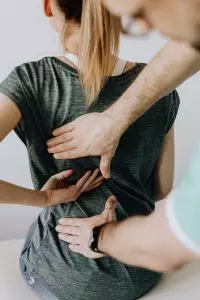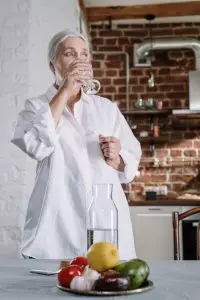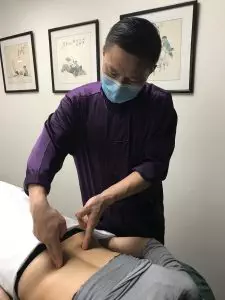By Qineng Tan, L.Ac., Ph.D. and Xiaomei Cai, L.Ac., Ph.D.

Severe lower back pain, blood in urine, burning pee? These could be signs of kidney stones. Acupuncture and TCM offer an alternative or adjunct kidney stones treatment that can help relieve kidney stone pain and dysuria, or painful urination.
Kidney stones are hard mineral deposits that form in the kidneys or other parts of the urinary tract. Salt and minerals can crystallize when urine reaches a certain level of concentration.
Often, kidney stones form when there are calcium oxalate crystals in urine. Calcium levels can be high because of eating too much sodium.
The ureters are the tubes that connect the kidneys to the bladder. If a kidney stone moves into a ureter and becomes lodged there, it can cause left lower back pain or right lower back pain. This is known as “passing a kidney stone.”
Kidney stones are very common, and many people go to the ER when they are experiencing severe lower back pain on one side and peeing blood. This happens when one or more kidney stones find their way into one of the ureters and become lodged there. This blocks the flow of urine and can cause severe pain and cramping.
Acupuncture can help reduce kidney stone pain in the short term, and help address the imbalances that are the root cause of kidney stones.
What Causes Kidney Stones?

Kidney stones form when there is not enough urine, and it becomes too concentrated. This often is due to not drinking enough fluids and getting dehydrated. Other kidney stone causes include:
- Not drinking enough water, dehydration
- Too much salt
- Too much sugar, fructose, or high fructose corn syrup
- Too much meat, too few fruits and vegetables
- Lack of exercise or too much exercise
- weight loss surgery, bariatric surgery, which can cause chronic diarrhea
- Infections, UTIs
- Gout
- Chronic diarrhea due to Crohn’s disease, ulcerative colitis
- Type 2 Diabetes, high blood sugar levels
Kidney stones are differentiated into different types, depending on their mineral composition. The types of kidney stones are:
- Calcium stones – deposits of calcium oxalate or calcium phosphate
- Uric acid stones – high levels of uric acid can be due to eating a lot of animal proteins
- Struvite stones – can form after a UTI
- Cystine stones – cystinuria is an inherited condition that causes buildup of the amino acid cystine in the urinary tract
Top 10 Symptoms of Kidney Stones
Many people have kidney stones and are not aware of them. It is possible to have kidney stones without pain or kidney stones without urinary symptoms. You may only find out about them when having imaging tests done for some other reason.
However, passing a kidney stone can certainly cause intense pain and other upsetting symptoms. The most common signs of kidney stones include:
- Sharp pain on one side of the lower back
- Cramps in one side
- Pain in the lower abdomen or groin
- Urgent need to pee, urinary urgency
- Peeing a lot, urinary frequency
- Burning sensation when peeing, dysuria
- Dark urine, blood in urine
- Nausea, vomiting
- Pain at the tip of the penis
- Fever and/or chills
Kidney stone pain can range from mild to severe, and it can come and go or be constant.
Acupuncture treatment has been shown to be effective for reducing kidney stone pain when used as an adjunct in emergency medical care settings when someone is waiting for conventional treatment.
Treatment for Kidney Stones
Kidney stones are diagnosed through blood tests and urine tests, which will show if there is too much uric acid, calcium, or other minerals that can cause stones to form. Imaging tests, such as ultrasound, may be able to detect where stones are stuck in the urinary tract.
If a person is passing stones (kidney stones in toilet), they may be analyzed to determine what sort of mineral has formed them.
In many cases, people will be encouraged to wait until the stones pass on their own. In this case, simply drinking adequate fluids and using pain medication to manage the intermittent pain and cramping will be recommended. Medications such as alpha blockers (Flomax) may be prescribed to help relax the ureters.
If the kidney stones are too large to be passed, then surgery may be indicated. Procedures using sound waves are sometimes used to help break up the stones. Surgery using small scopes and instruments can also remove the stones. A stent may be placed in the ureter to help keep it open until swelling goes down and it heals.
Studies have indicated that a combination of medications like Flomax and Chinese herbs may help to expel kidney stones. TCM treatment can help prevent the need for surgery.
Can Acupuncture and Herbs Help Kidney Stones?

According to TCM theory, kidney stones are in the category of “Shilin” conditions, in which urination is difficult. Chinese herbs have traditionally been used to help balance the electrolyte minerals in the body, which helps prevent stones from forming in the urinary tract.
TCM treatment for kidney stones includes herbal medicine to help increase urine volume and excretion of minerals and inhibits the formation of calcium crystals.
Acupuncture treatment has an anesthetic effect which can help relieve the pain of kidney stones while other treatments take effect to help reduce and prevent the formation of new kidney stones.
One trial found that acupuncture treatment helped relieve kidney stone pain faster than pharmacological medications. Acupuncture treatment has no side effects, while 43% of the people in the study who were given intramuscular anesthesia report side effects like skin rash, irregular heartbeat, and drowsiness.
Acupuncture and acupressure can help relieve severe back pain and pelvic pain due to various urinary and other reproductive system conditions. It can also help reduce the anxiety and depression that people sometimes experience when faced with severe pain.
How to Prevent Kidney Stones
Drinking plenty of water is probably the most important thing you need to do to prevent dehydration and low volume of urine. In addition to staying hydrated, you should:
- Reduce sodium intake by eating less salt and fewer processed and packaged foods.
- Reduce foods that encourage calcium oxalate stones: meats, berries, beer, black pepper, spinach, chocolate/cocoa, and tea.
- Combine calcium-rich foods or drinks with foods that contain oxalate, so that they can be absorbed well together. This could mean eating spinach with cheese, or berries with yogurt. The citrate in citrus juices can also help discourage stone formation.
- Add foods with a high ratio of magnesium to calcium, such as: brown rice, oats, barley, bananas, soybeans, and flaxseeds.
- Be sure to replace lost fluids when you sweat through exercise or by being in a sauna, steam room, or hot tub, or just by being in the heat during the summertime.
- Balance your Ph levels. For some people this may mean increasing alkaline foods. As your acupuncturist about checking your Ph levels.
Acupuncture Near Me for Kidney Stones, Los Angeles
TCM treatment can help reduce pain and address the root causes of many conditions that cause urinary urgency and frequency, like BPH, UTIs, chronic kidney disease (CKD), and interstitial cystitis. Acupuncture can also help relieve pelvic pain and low back pain due to many other conditions, like endometriosis, and mittelschmerz. If you are experiencing urinary symptoms or recurring bladder pain or back pain, consider consulting an experienced acupuncture practitioner to resolve the root issue.
*This article is for education from the perspective of Traditional Chinese Medicine only. The education provided by this article is not approved by FDA to diagnose, prevent, treat and cure human diseases. It should not stop you from consulting with your physician for your medical conditions. Traditional Chinese Medicine is based on Qi, which is an invisible force that usually cannot be observed by modern science. Because science focuses on testing ideas about the natural world with evidence obtained through observation, these aspects of acupuncture can’t be studied by science. Therefore acupuncture and Chinese herbs are often not supported by double-blind, randomized trials, and they are considered alternative medicine therapies in the United States.
